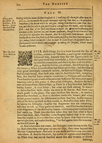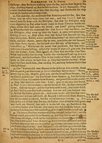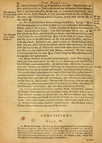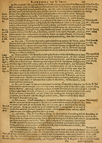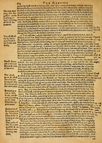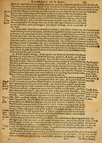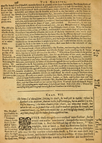Having with five loaves fed five thousand (16) (walking also the night after upon the sea) (22) on the morrow the people thereupon resorting unto him, (27) he preacheth unto them of the Bread which he will give: telling them that he is come from Heaven, and therefore able to give such bread as can quicken the world, even his own flesh: and that all his Elect shall believe as much. (60) Many notwithstanding do murmur at this doctrine yea and become apostates, though he tell them that they shall see by his Ascension into Heaven, that he is descended from Heaven. But the Twelve stick unto him, Peter in all their names confessing that he is God Omnipotent. (70) Among which twelve (yet that no man be scandalised) he signifieth that he foreknoweth which will become a traitor: as among the foresaid, which would become apostates.
Jesus went beyond the sea of Galilee, which is of Tiberias. 2and a great multitude followed him, because they saw the signs which he did upon those that were sick. 3Jesus therefore went up into the mountain, and there he sat with his Disciples. 4And the Pasch was at hand, the festival day of the Jews. 5When Jesus therefore had lifted up his eyes, and saw that a very great multitude cometh to him, he saith to Philip: Whence shall we buy bread: that these may eat? 6And this he said, tempting him. For himself knew what he would do. 7Philip answered him: Two hundred penny worth of bread is not sufficient for them, that every man may take a little piece. 8One of his Disciples, Andrew the brother of Simon Peter, saith to him: 9There is a boy here that hath five barley loaves, and two fishes; but what are these among so many? 10Jesus therefore saith: Make the men to sit down. And there was much grass in the place. The men therefore sat down, in number about five thousand. 11Jesus therefore took the loaves; and when he had given thanks, he distributed to them that sat. In like manner also of the fishes as much as they would. 12And after they were filled, he said to his Disciples: Gather the fragments that are remaining, lest they be lost. 13They gathered therefore, and filled twelve baskets with fragments of the five barley loaves, which remained to them that had eaten. 14Those men therefore when they had seen what a sign Jesus had done, said: That this is the Prophet indeed that is to come into the world. 15Jesus therefore when he knew that they would come to take him, and make him king, * he fled again into the mountain himself alone.
16And when even was come, his Disciples went down to the sea. 17And when they were gone up into the ship, they came beyond the sea into Capharnaum. And now it was dark and Jesus was not come unto them 18And the sea arose, by reason of a great wind that blew. 19When they had rowed therefore about five and twenty or thirty furlongs, they see Jesus walking upon the sea, and to draw nigh to the ship, and they feared. 20But he saith to them: It is I, fear not. 21They would therefore have taken him into the ship: and forthwith the ship was at the land to which they went.
22The next day, the multitude that stood beyond the sea, saw that there was no other boat there but one, and that Jesus had not entered into the boat with his Disciples, but that his Disciples only were departed. 23But other boats came in from Tiberias beside the place where they had eaten the bread, our Lord [a] giving thanks. 24When therefore the multitude saw that Jesus was not there, nor his Disciples, they went up into the boats, and came to Capharnaum seeking Jesus. 25And when they had found him beyond the sea, they said to him: Rabbi, when camest thou hither? 26Jesus answered them, and said: Amen, amen I say to you, you seek me not because you have seen signs, but because you did eat of the loaves, and were filled. 27 • Work not the meat that perisheth, but that endureth unto life everlasting, which the Son of man will give you. For him the Father, God, hath signed. 28They said therefore unto him: What shall we do that we may work the works of God? 29Jesus answered, and said to them: This is the work of God, that you believe in him whom he hath sent. 30They said therefore to him: What sign therefore doest thou, that we may see, and may believe thee? What workest thou?
31Our * Fathers did eat Manna in the desert, as it is written, Bread from Heaven he gave them to eat. 32Jesus therefore said to them, [b] Amen, amen I say to you: Moyses gave you not the bread from Heaven, but my Father giveth you • the true bread from Heaven. 33For the bread of God it is that descendeth from Heaven, and giveth life to the world. 34They said therefore unto him: Lord, give us always this bread. 35And Jesus said to them: I am the bread of life, he that cometh to me, shall not hunger; and he that believeth in me, shall never thirst. 36But I said to you that both you have seen me and you believe not. 37All that the Father giveth me, shall come to me; and him that cometh to me I will not cast forth. 38Because I descended from Heaven, not to do mine own will, but the will of him that sent me. 39For this is the will of him that sent me, the Father; that all that he hath given me I lose not thereof, but raise it in the last day. 40And this is the will of my Father that sent me; that every one that seeth the Son, and believeth in him, have life everlasting, and I will raise him in the last day.
41The Jews therefore murmured at him, because he had said: I am the bread which descended from Heaven; 42and they said: Is not this Jesus the son of Joseph, whose father and mother we know? How then saith he, That I descended from Heaven? 43Jesus therefore answered and said to them: Murmur not one to another; 44no man can come to me, unless the Father that sent me, • draw him, and I will raise him up in the last day. 45It is written in the Prophets, And all shall be docible of God. Every one that hath heard of the Father, and hath learned, cometh to me. 46Not that any man hath seen the Father, but he which is of God; this hath seen the Father. 47Amen, amen I say to you, he that believeth in me, hath life everlasting. 48I am the bread of life. 49Your fathers did eat • Manna in the desert; and they died. 50This is the bread that descendeth from Heaven: that if any man eat of it,he die not. 51I am the living bread, that came down from Heaven. If any man eat of this bread, he shall live for ever: and * the bread which I will give, is my flesh for the life of the world.
52The Jews therefore strove among themselves, saying: • How can this man give us his flesh to eat? 53Jesus therefore said to them: Amen, amen I say to you, • Unless you eat the flesh of the Son of man, • and drink his blood, • you shall not have life in you. 54He that eateth my flesh, and drinketh my blood, hath life everlasting: and • I will raise him up in the last day. 55For my flesh, is • meat indeed: and my blood is drink indeed. 56He that eateth my flesh, and drinketh my blood, abideth in me, and I in him. 57As the living Father hath sent me, and I live by the Father: and he that eateth me, the same also shall live by me. 58This is the bread that came down from Heaven. Not as your Fathers did eat manna, and died. • He that eateth this bread, shall live for ever. 59These things he said teaching in the Synagogue, in Capharnaum.
60Many therefore of his Disciples hearing it, said: This saying is hard, and who can hear it? 61But Jesus knowing with himself that his Disciples murmured at this, he said to them: Doth this scandalise you? 62 • If then you shall see * the Son of man ascend where he was before? 63It is the spirit that quickeneth, • the flesh profiteth nothing. The words that I have spoken to you, be spirit and life. 64But there be certain of you • that believe not. For Jesus knew from the beginning who they were that did not believe, and who he was that would betray him. 65And he said: Therefore did I say to you, that no man can come to me, unless it be given him of my Father. 66After this many of his Disciples • went back; and now they walked not with him.
67Jesus therefore said to the Twelve: What, will you also depart? 68Simon • Peter therefore answered him: Lord, to whom shall we go? Thou hast the words of eternal life. 69And we believe and have known that thou art Christ the Son of God. 70Jesus answered them: Have not I chosen you the Twelve; and of you one is a Devil? 71And he meant Judas Iscariot, Simon’s son: for this same was to betray him, whereas he was one of the Twelve.
Footnotes
ANNOTATIONS. CHAP. VI.
↑ 27. Work not the meat.) By their greedy seeking after him for meat of the body, he taketh occasion to draw them to the desire of a more excellent food which he had to give them, and so by little to open unto them the great meat and mystery of the Bl. Sacrament: which (as he proveth) doth not only far pass their ordinary bread or his marvellous multiplied loaves, but Manna itself, which they thought came from Heaven, and so much wondered at it.
↑ 32. The true bread.) Though the Person of Christ incarnate, even out of the Sacrament also, be meant under the Metaphors of bread and drink from Heaven: and our belief in him, be signified by eating and feeding: yet the causes why they should be recommended unto us in such terms, were, that he was to be eaten and drunken indeed in the forms of bread and wine: for the which cause his body on the cross is called his bread: and his blood shed on the cross, * the blood of the grape: no doubt because the same body and blood were in Holy Sacrament to be eaten and drunken. In which speeches, either of Christ’s person generally, or peculiarly of the same as in the Bl. Sacrament the true bread is not taken properly and specially for that substance which is of corn, and called with us bread; but generally for food or meat: and therefore it hath joined with it lightly a term signifying a more excellent sort of sustenance: as, the true bread, the bread of Heaven, the bread of life, Supersubstantial bread. In which sort the holy Sacrament which is Christ’s body, is both here, and in St. Luke and St. Paul also, often called bread even after consecration: not only for that it was made of bread, but because it is bread more truly, and by more excellent property and calling, than that which ordinarily is named bread.
↑ 44. Draw him.) The Father draweth us and teacheth us to come to his Son, and to believe these high and hard mysteries of his incarnation and of feeding us with his own substance in the Sacrament: not compelling or violently forcing any against their will or without any respect of their consent, as Heretics pretend; but by the sweet internal motions and persuasions of his grace and spirit he wholly maketh us of our own will and liking to consent to the same.
↑ 49. Manna, and died.) The Heretics holding the Fathers of the old Testament to have eaten of the same meat, and to have had as good Sacraments as we, be here refuted: Christ putting a plain difference in the very substance thereof, and in the graces and effects much more at large. Manna was only a figure of the Bl. Sacrament, though a very excellent figure thereof for many causes. It came in a sort from heaven, our Sacrament more: it was made by God miraculously, our Sacrament more: it was to be eaten for the time of their peregrination, our Sacrament more: it was to every man what he liked best, our Sacrament more: a little thereof served and sufficed as well as much, our Sacrament more: it was reserved for such days as it could not be gathered, and our Sacrament much more: it was kept for a memorial in the ark of the Testament, our Sacrament much more: the discontented and incredulous murmured and gainsayed it, at our Sacrament much more, it sustained their bodies in the desert, our Sacrament, both body and soul much more.
↑ 52. How can this man?) It came not to their mind that nothing was impossible to God, that wickedly said, How can this man give us his flesh? but we may make great profit of their sin, believing the Mysteries, and taking a lesson, never to say or once think, How? for it is a Jewish word and worthy all punishment. So saith St. Cyril. lib. 4 ch. 11 in Joh. Nevertheless if one asked only for desire to learn in humility, as our Lady did touching her having a child in her virginity, then he must take the Angel’s answer to her, That it is of the Holy Ghost. So saith St. Damascene lib. 4. ch. 14.
↑ 53. Unless you eat.) Christ commending the Sacrament of the faithful unto us, said, Except you eat &c. you can not have life in you. So the life saith of life: and to him that thinketh the life to be a liar, this meat shall be death and not life to him. Aug. Ser. 2 de verb. Ap. ch. 1. And S. Leo thus: Because our Lord saith, Except you eat &c. let us so communicate that we nothing doubt of the truth of Christ’s body and blood: for that is received with mouth, which is believed in heart: and they answer Amen in vain, that dispute against that which they receive.
↑ 53. And drink.) This the Protestants allege for the necessity of receiving in both kinds: but in respect of themselves (who lightly hold all this chapter to pertain nothing to the Sacramental receiving, but to spiritual feeding on Christ by faith only) it can make nothing for one kind or other. And in respect of us Catholics, who believe Christ’s whole Person both humanity and Divinity, both flesh and blood to be in either form, and to be wholly received no less in the first, than in the second or in both, this place commandeth nothing for both the kinds.
↑ 53. You shall not have life.) Though the Catholics teach these words to be spoken of the Sacrament, yet they mean not (no more than our Saviour here doth) to exclude all from salvation, that receive not actually and Sacramentally under one or both kinds. For then children that die after they be baptized and never received Sacramentally, should perish: which to hold, were heretical. * Neither did St. Augustine mean, applying these words to infants also, that they could not be saved without receiving sacramentally, as not only the Heretics, but Erasmus did unlearnedly mistake him: but his sense is that they were by the right of their Baptism joined to Christ’s body Mystical, and thereby spiritually partakers of the other Sacrament also of Christ’s body and blood. As all Catholic men that be in prison, joining with the Church of God in heart and desire to receive and be partakers with the Church of this Sacrament, and those specially that devoutly hear Mass and adore in presence the body and blood of Christ, joining in heart with the Priest, all these receive life and fruit of the Sacrament, though at every time they receive not sacramentally in one or both kinds. And although in the Primitive Church the holy Sacrament in the second kind were often given even to infants to sanctify them, yet (as the holy Council hath declared) it was never ministered unto them with opinion that they could not be saved without it. And therefore the Heretics do untruly charge the Church and the Fathers with that error.
↑ 54. I will raise him.) As the Son liveth by the Father, even so do we live by his flesh, saith St. Hilary. lib. 8. de Trin. And St. Cyril again thus: Though by nature of our flesh we be corruptible, yet by participation of life we are reformed to the property of life. For not only our souls were to be lifted up by the Holy Ghost to life everlasting, but this rude gross terrestrial body of ours is to be reduced to immorality, by touching, tasting, and eating this agreeable food of Christ’s body. And when Christ saith: I will raise him up, he meaneth that this body which he eateth, shall raise him. Our flesh (saith Tertullian) eateth the body and blood of Christ, that the soul may also be fatted. Therefore they shall both have one reward at the Resurrection. And St. Irenaeus, How do they affirm that our bodies be not capable of life everlasting, which is nourished by the body and blood of our Lord? Either let them change their opinion, or else cease to offer the Eucharist. St. Gregory Nyssene also saith: That lively body entering into our body, changeth it and maketh it like and immortal.
↑ 55. Meat indeed.) Manna, was not the true meat: nor the water of the rock, the drink indeed: for they did but drive away death or famine for a time and for this life. But the holy Body of Christ is the true food nourishing to life everlasting, and his blood the true drink that driveth death away utterly, for they be not the body and blood of a mere man, but of him that being joined to life is made life: and therefore are we the body and members of Christ, because by this benediction of the mystery we receive the Son of God himself. So saith St. Cyril lib. 4. ch. 16 in Joh.
↑ 58. he that eateth this bread.) By this place the holy Council proveth that for the grace and effect of the Sacrament, which is the life of the soul, there is no difference whether a man receive both kinds or one. Because our Saviour who before attributed life to the eating and drinking of his body and blood, doth here also affirm the same effect, which is life everlasting, to come of eating only under one form. Therefore the Heretics be seditious calumniators that would make the people believe, the Catholic Church and Priests to have defrauded them of the grace and benefit of one of the kinds in the Sacrament. Nay, it is they that have defrauded the world, by taking away both the real substance of Christ, and the grace from one kind and both kinds, and from all other Sacraments. The Church doth only (by the wisdom of God’s Spirit and by instruction of Christ and his Apostles, according to time and place, for God’s most honour, the reverence of the Sacrament, and the peoples most profit thereby) dispose of the manner and order how the Priest, how the people shall receive, and all other Particular points, which himself (saith St. Augustine) did not take order for, that he might commit that to the Apostles, by whom he was to dispose his Church’s affairs. Though both he and the Apostles and the Fathers of the primitive Church left us example of receiving under one kind, Christ at Emmaus, The Apostles Act. 2, 42. The primitive Church in giving the blood only to children, Cypr. lib. de lapsis, nu. 10. In reserving most commonly the body only, Tertul. lib. 2 ad uxo. num. 4. Cypr. li. de lapsis, nu. 10. In housing the sick therewith, Euseb. Ec. hist. lib. 6 ch. 36. In the holy Eremites also that received and reserved it commonly and not the blood, in the wilderness, Basil. ep. ad Caesariam Patritiam. And in diverse other cases which were too long to rehearse.
Whereby the Church being warranted and in the ruling of such things fully taught by God’s spirit, as well for the reproving of certain heresies, that Christ God and man was not whole and all in every part of the Sacrament, as specially for that the Christian people being now enlarged, and the communicants often so many at once, that neither so much wine could be conveniently consecrated, nor without manifold accidents of shedding or abusing be received (whereof the Protestants have no regard, because it is but common wine which they occupy, but the Church knowing it to be Christ’s own blood, must have all dreadful regard) therefore I say she hath decreed and for some hundred years put in use, that the Priest saying Mass, should always both consecrate and also receive both kinds, because he must express lively the Passion of Christ, and the separation of his blood from his body in the same, and for to imitate the whole action and institution as well in sacrificing as receiving, as to whom properly it was said: Do this; for that was spoken only to such as have power thereby to offer and consecrate: But the Lay men, and the Clergy also when they do not execute or say Mass themselves, should receive in one kind, being thereby no less partakers of Christ’s whole Person and grace, than if they received both. For (as St. Paul saith) He that eateth the hosts, is partaker of the Altar. He that eateth, saith he: for though there were drink-offerings or libaments joined lightly to every Sacrifice, yet it was enough to eat only of one kind, for to be partaker of the whole.
↑ 62. If you shall see.) Our Saviour seemeth to insinuate, that such as believe not his words touching the holy Sacrament, and think it impossible for him to give his Body to be eaten in so many places at once, being yet in earth, should be much more scandalised and tempted after they saw or knew him to be ascended into Heaven. Which is proved true in the Capharnaites of this time. Whose principal reason against Christ’s presence in the Sacrament is, that he is ascended into Heaven: yea, who are so bold as to expound this same sentence for themselves thus, It is not this body or flesh which I will give you, for that I will carry with me to Heaven. Whereby if they meant only that the condition and qualities of his body in Heaven should be other than in the Sacrament, it were tolerable: for St. Augustin speaketh sometime in that sense. But to deny the substance of the body to be the same, that is wicked.
↑ 63. The flesh profiteth nothing.) If this speech were spoken in the sense of the Sacramentaries, it would take away Christ’s Incarnation, manhood and death, no less than his corporal presence in the Sacrament. For if his flesh were not profitable, all these things were vain. Therefore CHRIST denieth not his own flesh to be profitable, but that their gross and carnal conceiving of his words, of his flesh and of the manner of eating the same, was unprofitable: which is plain by the sentence following, where he warneth them, that his words be spirit and life, of high Mystical meaning, and not vulgarly and grossly to be taken, as they took them. And it is the use of the Scripture to call man’s natural sense, reason and carnal resisting or not reaching supernatural truths, flesh or blood, as, Flesh and blood revealed not this to thee &c. Mat. 16.
This carnality then of theirs, stood in two points specially: first, that they imagined that he would kill himself, and cut and mangle his flesh into parts, and so give it them raw or rost to be eaten among them. Which could not be meant, saith St. Augustin: for that had contained a heinous and barbarous fact; and therefore they might and should have been assured, that he would command no such thing: but some other sweet sense to be of his hard, mystical or figurative words, and to be fulfilled in a Sacrament, mystery, and a marvellous divine sort, otherwise than they could comprehend. Secondly, they did err touching his flesh, in that they took it to be the flesh of a mere man, and of a dead man also, when it should come to be eaten: of which kind of flesh Christ here pronounceth, that it profiteth nothing. Whereupon St. Cyril saith: This body is not of Peter or Paul or any other like, but of Christ JESUS who is the life itself: and therefore this Body giveth life, the very fullness of the Divinity dwelling in it. And the holy Council of Ephesus in the 11th Anathematism expounded also by the said St. Cyril: The Eucharist is not the body of any common person (for the flesh of a common man could not quicken) but of the WORD itself. But the Heretic Nestorius dissolveth the virtue of this Mystery, holding man’s flesh only to be in the Eucharist. Thus there. And St. Ignatius cited of Theodoret, and many other Fathers have the like. Whereby we may see that it cometh of the Divinity and Spirit (without which Christ’s flesh can not be) that this Sacrament giveth life.
↑ 64. That believe not.) It is lack of faith, you see here, that causeth men to spurn against this high truth of the Sacrament: as also it may be learned here, that it is the great and merciful gift of God that Catholic men do against their senses and carnal reasons, believe and submit themselves to the humble acknowledging of this Mystery: lastly, that it may well * by Christ’s insinuation of Judas, be gathered, that he specially spurned against our Master’s speeches of the holy Sacrament.
↑ 66. Went back.) It can be no marvel to us now that so many revolt from the Church, by offence or scandal unjustly taken at Christ’s body and blood in the Sacrament: seeing many of his Disciples that saw his wonderful life, doctrine, and miracles, forsook Christ himself, upon the speech and promise of the same Sacrament. For the mystery of it is so supernatural and divine in itself, and withal so low and base for our sakes, by the show of the forms of these terrene elements under which it is, and we eat it; that the unfaithful and infirm do so stumble at Christ in the Sacrament, as the Jews and Gentiles did at Christ in his humanity. For, the causes of contradictions of the Incarnation and Transsubstantion be like. And it may be verily deemed, that whosoever now can not believe the Sacrament to be Christ, because it is under the forms of bread and wine, and is eaten and drunken, would not then have believed that Christ had been God, because he was in shape of man, and crucified. To conclude, it was not a figure nor a mystery of bare bread and wine, nor any Metaphorical or Allegorical speech, that could make such a troup of his Disciples revolt at once. When he said he was a door, a vine, a way, a Pastor and such like (unto which kind of speeches the Protestants ridiculously resemble the words of the holy Sacrament) who was so mad to mistake him, or to forsake him for the same? For the Apostles at the least would have plucked them by the sleeves, and said: Go not away my Masters, he speaketh parables. The cause therefore was their incredulity, and the height of the Mystery, for that they neither knew the means how it might be present, nor would believe that he was able to give his flesh to be eaten in many places. And even such is the unbelief of the Heretics about this matter at this day.
↑ 68. Peter answered.) Peter answereth for the Twelve, not knowing that Judas in heart was already nought, and believed not Christ’s former words touching the Bl. Sacrament, but was to revolt afterward as well as the other. * Wherein as Peter beareth the person of the Church and all Catholic men, that for no difficulty of his word, nor for any revolt (be it never so general) of Schismatics, Heretics or Apostates, either for this Sacrament or any other Article, will ever forsake Christ: So Judas was the chiefest suborner, maintainer and father of this heresy against the real presence of Christ’s body and blood in the Bl. Sacrament, and of the revolt from him for the same: as St. Augustin teacheth in enarratione Psal. 54. adver. 22. and Psal. 55. ad ver. 7. declaring withal that this was the first heresy against Christ’s doctrine, and worthily commending St. Peter for his humble obedience, in receiving Christ’s speech, and firmly believing his words to be true and good, which he did not yet understand. By whose example therefore when company draweth us to revolt, let us say thus: Lord, whither or to whom shall we go, when we have forsaken thee? to Calvin, Luther or such, and forsake thee and thy Church with the unfaithful multitude? No, thou hast the words of life, and we believe thee, and thy Church will not nor can not beguile us. Thou hast (saith the same St. Augustine) life everlasting in the ministration of thy body and blood. And a little after: Thou art life everlasting itself, and thou givest not in thy flesh and blood but that which thyself art.
Margin Notes
- intro. The 3 part. His Acts in Galilee, and in Jewry, about the third Pasch and after.
- 1–15. The Ghospel upon Midlent Sunday.
- 36–40. The Ghospel in the Anniversary of the dead.
- 46–51. The Ghospel in the Ember Wednesday in whitsun week.
- 51–55. The Ghospel in a daily Mass for the dead.
- 56–59. The Ghospel upon Corpus Christi day.
- annot. 32. the true bread.
- Why Christ is called bread, and beleeving, eating.
- What signifieth, The true bread.
- The Bl. Sacrament called bread.
- annot. 44. draw him. God draweth us with our free-will.
- annot. 49. manna and died. The manifold pre-eminence of the Bl. Sacrament above manna.
- annot. 52. how can this man. In the Bl. Sacrament, How is a Jewish word.
- annot. 53. unless you eat. The real presence.
- annot. 53. and drink. Receiving in both kinds not necessary.
- annot. 53. you shall not have life.
- The Sacramental receiving of Christs body, not always necessary to salvation.
- The true meaning of St. Augustin’s words touching infants receiving of the Bl. Sacrament.
- annot. 54. I will raise him.The effects of the Bl. Sacrament both in our body and soul.
- annot. 55. meat indeed. The Bl. Sacrament is the true Manna and water of the rock.
- annot. 58. he that eateth this bread.
- The whole grace and effect thereof in one kind; and therefore the people not defrauded.
- Receiving in one or both kinds, indifferent, according to the holy Church’s appointment.
- Authority of Scriptures and the Primitive Church for receiving in one kind.
- The causes of the Church’s practice and ordinance concerning one kind.
- The Priests that say Mass, must receive both kinds.
- annot. 62. if you shall see. Christ insinuateth that faithless men shall not believe his presence in the Bl. Sacrament, becaue he is ascended.
- annot. 63. the flesh profiteth nothing.
- The Capharnaites gross understanding of Christ’s flesh to be given or eaten. And, how this flesh doth profit, and not profit.
- Christ’s flesh giveth life because it is the flesh of God and man.
- annot. 64. that believe not. Judas the chief of them that believe not the real presence.
- annot. 66. went back.
- Heretics believe not the real presence, because they see bread and wine: as the Jews believed not his Godhead because of the shape of a poor man.
- The disciples revolting at Christ’s words, prove that he spoke not metaphorically, as at other times.
- annot. 68. Peter answered. As St. Peter beareth the person of all believing Catholics: so Judas of all unbelieving Heretics. He being the first Arch-heretic; and this against the Bl. Sacrament, the first heresy.
Margin References
- 1. Mat. 14, 13. Mr. 6, 32. Luc. 9, 10.
- 15. Mat. 14, 23. Mar. 6, 46.
- 31.
- Exo. 16, 4. 14.
- Psal. 77, 24.
- 45. Esa. 54, 13.
- 51. Mat. 26, 26. Mar. 14, 22. Lu. 22, 19. 1. Cor. 21, 24.
- 62. Joh. 3, 13.
- annot. 32. the true bread.
- * Jerem 11, 19. Gen. 49, 11.
- Luc. 24, 35. Act. 2, 42. 20, 7. 1 Cor. 10.
- annot. 49. manna and died. The manifold pre-eminence of the Bl. Sacrament above manna. Aug. cont. duas. Ep. Pelag. lib. 1. ch. 19 & Ser. 2. de verb. Ap. ch. 2.
- annot. 53. unless you eat. Ser. 6. de jejun. 7. mens.
- annot. 53. you shall not have life.
- Lib. 1. de pec. merit. ch. 20.
- conc. Trid. Ses. 21. c. 4.
- annot. 54. I will raise him.
- Cyril lib. 4. ch. 14. 15.
- Tertul. de. resur. car. nu. 7.
- Lib. 4. ch. 34.
- Nyss. in orat. cathech magna.
- annot. 58. he that eateth this bread.
- Conc. Trid. Ses. 21. c. 1.
- Ep. 118. ch. 6 ad Januariaum.
- Luc. 24, 15.
- Luc. 22, 19. 1 Cor. 11.
- 1. Cor. 10, 18.
- annot. 63. the flesh profiteth nothing.
- August. Doct. Chr. li. 3. c. 13.
- Li. 4. c. 23. in Jo.
- Ignatius apud Theodor. dial. 3.
- annot. 64. that believe not. * vers. 64
- annot. 68. Peter answered.
- * Cypr ep. 55. nu. 3.
- Tract. 27. in Evang. Jo.
